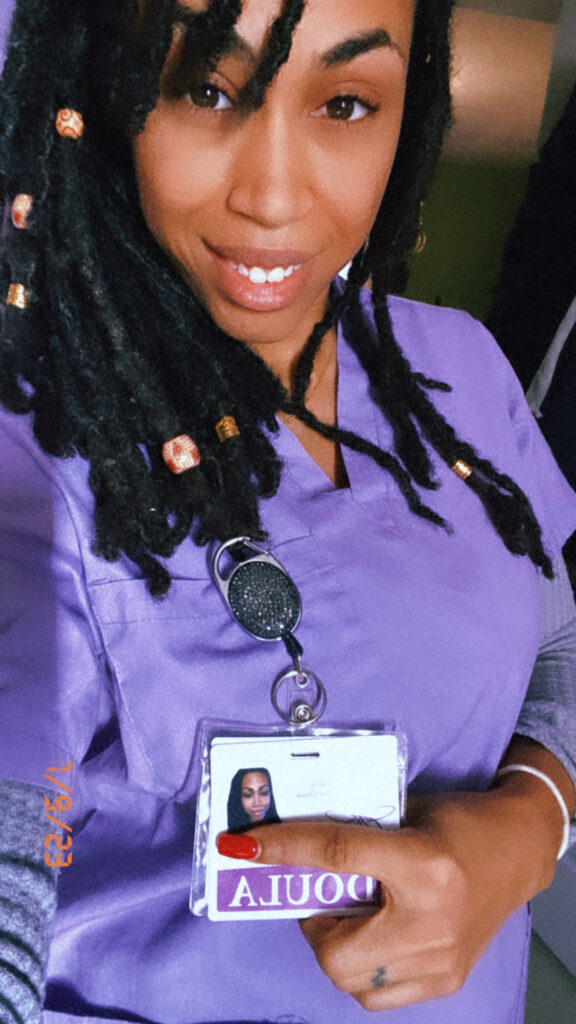Childbirth doulas are becoming more popular, and much of the conversation about the role is happening among Black birthing mothers. Black Maternal Health Week 2023 is underway. 21Ninety is exploring questions Black mothers may be asking when it comes to Doula work.
It’s not uncommon to hear stories about health disparities during the Black birthing experience. Safe, wellness-centred birthing options are essential. Childbirth doulas have been a part of maternal birth-care for centuries. Black women are returning to this practice and incorporating childbirth doulas into the mix.
Chéna Davis s a certified Holistic Full Spectrum Doula. She is the owner of Butta’s Holistic Services and Founding President of The Diverse Doula Collective. Davis is also a wife and mother of three. Her love for birthwork and holistic health came through her culturally diverse upbringing. Davis is a New Jersey native who was raised in St. Croix the US Virgin Islands by her family of Guyanese heritage.
Life threw Davis into the role of advocate and support person for teen moms and moms of color. She is both the product of a teen pregnancy and became a mother herself, at 20 years old. Davis is led by the belief that care should be holistic. She incorporates the mind, body and spirit in her practice to achieve an optimal pregnancy experience. Since Davis was raised in St. Croix where the minority is the majority, she feels very strongly about fair care for Black and brown families, taking it back to the village mentality.
21Ninety spoke with Davis to hear her answers to some of her most-asked questions.

Everything you want to ask a doula, with Chéna Davis
21Ninety: What are the services that childbirth doulas typically give?
Chéna Davis: It varies from doula to doula and the community they serve, but you can almost always expect them to cover nutrition in pregnancy, labor positions, comfort measures, stages of labor and newborn care. I cover all of these things and more; partner support, childbirth education, breastfeeding preparation, as well as various holistic education services.
21N: How do doulas work aside other medical professionals during pregnancy?
Davis: A doula is the one care provider that you have hand chosen to offer emotional and physical support to align with you and your family. The doctors work for the hospitals, the nurses work for the hospitals and doctors but the doula is yours. They are the personal aspect you bring into an unfortunately “overly medicalized” experience. Even if you choose a home birth or birth center birthing experience, the doula is your companion to guide you through options and to advocate for your wants and needs throughout a vulnerable time and space.
21N: Should every birth-giver have a doula? How do you know if you need one?
Davis: Absolutely, every birth-giver should have a doula since there is no risk, only benefit. Doulas help to educate you on the capabilities and expectations of your body while going into labor, make sure you understand the medical jargon so you can make informed decisions and are present to help you advocate for yourself during your pregnancy and labor.
Unfortunately there are a glaring number of maternal deaths among Black and brown women and that alone is enough of a reason to arm yourself with a doula. The autonomy over our bodies that is our God-given right as beautiful birthing beings is not being respected or acknowledged in many birth spaces and that is not ok! A doula is one to make sure your boundaries are respected, your care is evidence-based and that your voice is heard throughout your journey. If any of these things do not occur, doulas are there to offer the proper support and resources to make sure your experience is not overlooked.
21N: What are the most important interview questions to ask a potential doula?
Davis: You want to ask a doula how she supports a person in labor. You want to know what her capabilities are and what to expect from her to know if it aligns with what you’re envisioning for your experience. Ask what have her experiences been with the provider or birthing space you are planning to work with. The doula can then tell you about what to expect and how they work with them. Also, you’ll want to understand what her philosophy is on care in pregnancy and labor. What does care look like for your potential doula? How will they approach your experience and help you feel ready for your journey? Lastly, How does she include your village (partner, parents, older children) into the pregnancy journey and birth space? You want a doula who understands the importance of engaging those around you in preparation to support you in your prenatal, laboring and postpartum journey. A good doula is one who engages and educates the whole village that it takes to raise the child.
21N: What are the misconceptions about childbirth doulas that you’d like to see debunked?
Davis: One misconception is that a doula is supposed to be confrontational and “speak up” for the client. While we most definitely advocate for our clients, the role of a doula is to educate and support you as the client so that you may speak up for yourself. We are not there to fight your battles, but arm you with the proper tools and fight beside you.
Another misconception is that if you have a doula then your pregnancy and birth journey is supposed to be a smooth one; things happen. Again, we cannot make your experience a positive one without your input. Pregnancy and parenting is not an easy road but a doula is there to support you in navigating it during the smooth and rocky parts. You have a role to play in your experience and have to remain steadfast in understanding your unique experience, the options you are alotted and remembering to be flexible.
Lastly, a big misconception is that doulas are only for birthing persons who want an unmedicated, natural labor experience. We are there for whatever experience you are looking to have. A good doula is supporting whatever your vision is, helping you to understand all the possibilities while holding onto your ideals surrounding the vision. As a minimum, we teach you the basics on what labor entails and how to prepare for it no matter which route you are hoping to take.
21N: How long do childbirth doulas typically work with expectant parents?
Davis: Typically from 12 weeks until 6 months. As a full spectrum doula, I work with clients before conception or at 12 weeks up until the first year of baby’s life.
This interview has been shortened for clarity and brevity.
